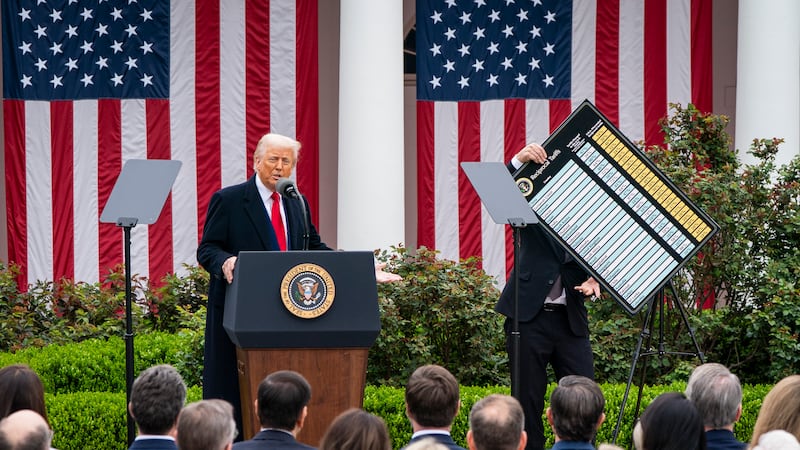British government hopes of joining a pan-European trade area to reduce post-Brexit supply chain challenges for UK goods exporters are being blocked by Brussels, according to officials on both sides.
The UK announced it was considering whether to join the Pan-Euro-Mediterranean (PEM) convention as part of its new trade strategy published last week, arguing it could help boost the UK’s flagging goods exports.
However, the European Commission has made clear to the UK that it would not currently support such a move, according to four people familiar with discussions, in a move the officials acknowledged had “frustrated” London.
The blockage is the first sign of friction between the UK and European Union (EU) since the two sides announced a “reset” of their relationship at a summit on May 18th, promising to improve energy trading arrangements and sign a so-called veterinary agreement to remove checks on agri-food exports.
RM Block
The PEM convention is an agreement between the EU and 20 other countries in Africa and the Middle East that allows inputs for manufacturing supply chains to be sourced across multiple countries in order to qualify for low-tariff access to markets under free trade agreements.
Joining PEM is a move supported by UK trade groups, including the British Chambers of Commerce. According to the UK’s trade strategy published last week it could reduce “complex paperwork” and “increase flexibility for UK exporters where they source their inputs”.
[ Brexit was ‘single stupidest thing a country’s ever done’Opens in new window ]
EU officials familiar with the discussion said the commission had decided that the UK joining PEM was not currently in the EU’s interests, because it would increase the risk of products unfairly qualifying for low-tariff access to the bloc.
UK prime minister Keir Starmer has ruled out rejoining the EU single market or re-entering into a customs union with the EU, but industry has pushed the government to consider joining the PEM convention as an interim step to help goods exporters.
Trade experts said the UK would need EU co-operation to join the convention because it would require rewriting the terms of the existing post-Brexit EU-UK trade deal – even though the PEM is not exclusively an EU arrangement.

IATA Director General Willie Walsh on airline profits, air fares and why the Dublin Airport passenger cap makes Ireland a laughing stock
“For it to be meaningful for the UK, the EU would need to agree to incorporate the PEM rules of origin into the EU-UK Trade and Cooperation Agreement. This gives the EU de facto blocking powers,” said Sam Lowe, trade lead at consultancy Flint Global.
Brussels indicated previously that it was open to the UK joining PEM, but has since gone cold on the idea, arguing that it wants to stick closely to the agreements proposed in the “common understanding” set out between the two sides at the May 18th summit.
In 2023, PEM was mooted as a solution to a stand-off over post-Brexit tariffs on electric vehicles, while as recently as January this year EU trade commissioner Maroš Šefčovič said it was something the EU “could consider”.
[ Supply risk identified for some UK animal medicines shipped to NorthOpens in new window ]
David Henig, a former UK trade negotiator now at the ECIPE think-tank, said the EU commission’s reluctance demonstrated the ongoing political challenge of repairing relations with the bloc.
“The EU isn’t united on the importance of the UK reset and issues like PEM can easily be caught up in this even though technically straightforward,” he said. “The UK government is going to have to work hard in London and Brussels to build momentum.”
Separately, in another point of tension, the EU is still demanding full implementation of the Windsor framework deal on Northern Ireland ahead of any veterinary agreement that would remove the need for most checks on goods crossing the Irish Sea.
The final phase of the Windsor framework deal came into force on July 1st. M & S boss Stuart Machin last week described the implementation as “bureaucratic madness”, saying it requires 1,000 products to have “not for EU” labels, and 400 more will have to undergo full customs checks.
[ The UK’s trade performance remains direOpens in new window ]
Machin added the promised EU-UK veterinary agreement “can’t come soon enough,” but EU officials said the commission was being “very firm” on the point that the deal must be fully implemented ahead of any EU-UK veterinary agreement.
Industry insiders said that European relations minister Nick Thomas-Symonds had called supermarkets to a meeting in Whitehall last Thursday to urge them to comply with the deal or risk jeopardising talks over the veterinary agreement.
The EU has repeatedly raised concerns that many big UK supermarkets are not fully complying with the rules.
The commission did not immediately respond to a request for comment.
The UK government said it was committed to full implementation of the Windsor framework and would review the merits of joining PEM through engagement with the trading group’s members, including the EU.
“We aren’t going to provide a running commentary on our ongoing discussions with the EU,” the Cabinet Office added. – Copyright The Financial Times Limited 2025
.


















